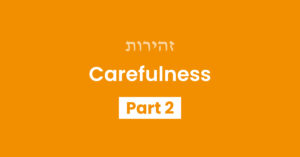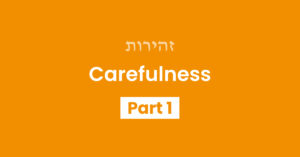So far, we have discussed 2 ways to strengthen our middah of Zehirus (being careful to perform mitzvos properly). First, we discussed how the first step in Zehirus is keeping our eyes open and paying attention to everything we do. If we don’t pay attention to what we’re doing, it’s as if we are living in darkness, like animals who act on instinct alone without thinking about what they’re doing.
Next, we discussed how another prerequisite for Zehirus is learning Torah. Specifically, we must learn halachos and make an effort to remember what we learned. The more clearly we understand what exactly is forbidden according to halacha, the better we will be able to defend ourselves against the yetzer hara when he tries to convince us that forbidden things are permitted, and vice versa.
This week, let’s take a look at another obstacle that gets in the way of Zehirus.
What Will Everyone Think of Me?
Did it ever happen that you wanted to do a mitzvah, but you were too embarrassed?
Maybe you wanted to say a bracha out loud so that others could answer Amen, but you were afraid everyone would think you are “so frum.”
Maybe you were already making a bracha out loud, but felt pressured to finish it quickly, so that people wont think you are “such a tzaddik” that you say your brachos slowly.
Maybe you wanted to say Asher Yatzar as soon as you walked out of the restroom, but were too embarrassed for other people to see you mumbling under your breath.
Maybe you were in the middle of telling a story, and suddenly you realized that the story is lashon hara… but you were too embarrassed to cut the story short in the middle.
Maybe you were schmoozing with a group of friends, and one of your friends started to make fun of a rebbi or teacher. You laughed along with everyone else, but deep down, your heart was sinking because you knew it was really disrespectful…
As much as we try to strengthen ourselves to perform mitzvos properly, the people surrounding us are not always so eager. They might think we are weird for caring about certain mitzvos, or they might talk to us with a mocking or condescending attitude.
What can we do about it?
The Only Thing That Matters
The key in these situations is to remember that the only thing that matters is what Hashem thinks of me. It doesn’t matter what my neighbor thinks, what my cousin thinks, what my brother thinks, or what my coworkers think of me. The only thing that matters is what Hashem thinks of me.
The only thing that matters is what Hashem thinks of me.
Of course, this doesn’t mean that we can ignore other people or be insensitive to their feelings. The Torah very much wants us to be nice, pleasant, friendly people who get along with everyone, as it says:1 “Anyone who is pleasing to other people is also pleasing to Hashem.” But we must never let our desire to be well-liked by human beings outweigh our desire to find favor in the eyes of Hashem.
When you are debating whether or not to tell that juicy story, you are pulled in two directions. On the one hand, you want to be popular, and part of being popular is telling stories that will make everyone laugh. But on the other hand, if this story is be lashon hara, then your popularity is actually quite short-lived. You’ll be popular in this world among your friends…. but in the Next World, what will your reputation be?
When we are pulled in different directions between doing what will make Hashem happy and what will make other people happy, we can utilize these opportunities to show Hashem that we care the MOST about making Hashem happy. Fulfilling Hashem’s wishes always takes precedence over entertaining other people or winning their favor.
We care the MOST about making Hashem happy.
Indeed, we can remind ourselves of this concept every time we bentsch, as we say: “V’nimtza Chein V’Seichel Tov B’Einei Elokim V’Adam. – Let us find favor in the eyes of Hashem, and in the eyes of man.“ In this sentence, “Elokim” comes before “adam” because our #1 priority must always be to find favor in the eyes of Hashem. Only as a secondary priority do we try to find favor in the eyes of “adam” (people) as well.
Being Embarrassed for Eternity
Chazal teach us that Olam HaZeh is compared to a long corridor, whose only purpose is to lead into the great beautiful “palace” at the end, which is Olam Haba.2 As long as we are walking through this corridor, our job is to collect as many mitvos as we can, and not let ourselves be distracted by the glitz, glamor and temptations of this world. When we get to Olam Haba, we will finally be able to enjoy the beautiful connection to Hashem that we have built for ourselves through all of the mitzvos we did in this world. Anyone who makes the right choices in this world will enjoy the benefits of these choices for all of eternity.
This desire to enjoy an everlasting connection with Hashem is what we daven for in the bracha of Ahava Rabba: “V’ha’eir Eineinu B’Sorasecha, V’Dabeik Leebeinu B’Mitzvosecha… V’Lo Neivosh L’Olam Va’Ed – Light up our eyes with Your Torah and help our hearts cling to your mitzvos… so that we will not be embarrassed for all of eternity.”
The Sifsei Chaim3 explains that “eternity” here refers to the eternity of Olam Haba. If a person invests all of his energy into trying to please people in this world – flattering people who are anti-Torah, telling juicy stories that contain lashon hara, or holding himself back from performing mitvos that he is too embarrassed to do – he may feel popular in this world, but when he gets to the Next World, he will be deeply ashamed and embarrassed! The truth will be revealed that Hashem is the only true power and that nothing else has any value outside of Him. The person will feel so ashamed for all the times he got sidetracked by the temptation to be rich and popular in this world, and forgot about what truly matters – doing Hashem’s will.
He may feel popular in this world, but when he gets to the Next World, he will be deeply ashamed and embarrassed!
In fact, the Sifsei Chaim explains that this sense of deep shame is actually what is meant by the fire of Gehinnom. The fire of Gehinnom is really the fire of the intense regret that a person experiences when he realizes that everything he thought was valuable in this world is really fake, and he wasted his life valuing all of the wrong things.
We daven not to make such a grevious mistake in the bracha of V’al HaTzaddikim in Shemoneh Esrei when we say, “V’sein Chelkeinu Imahem V’Lo Neivosh” – Please help us associate with the tzaddikim who know the true values of Olam Haba and who don’t get distracted by the glitz and glamor of Olam Hazeh… Why? “Velo Neivosh – So that we shouldn’t be embarrassed” for eternity when the truth is ultimately revealed.
This week, let’s make an extra effort to remind ourselves about what truly matters in life: doing Hashem’s will. Let’s strengthen ourselves with the awareness that the only thing that matters is what Hashem thinks of me. So if Hashem wants me to do a mitzvah or avoid an aveira, I will do so at all costs – even if it means people might make fun of me. Hopefully if we strengthen ourselves to fulfill Hashem’s will at all costs, then will be free of that intense sense of shame, guilt, and embarrassment that no person ever wants to experience in the Next World for eternity.
Sources: [1] Pirkei Avos 3:10; [2] Pirkei Avos 4:16; [3] Sifsei Chaim Middos Vol. 1 pg. 96
Your Challenge
Once a day, while being careful to do a mitzvah, think: “I am doing this mitzvah because what matters the MOST is what Hashem thinks of me.”
Ideally, try to do this in situations where you feel pressured or self-conscious in front of other people.
FOR EXAMPLE:
- Say a bracha out loud so that others can answer Amen
- Say Asher Yatzar slowly
- Say “Amen Yehieh Shmeih Rabbah…” out loud, slowly and clearly
- Say Amen slowly and clearly
- Make sure to wear something that is tznius
- Walk away from a conversation that contains lashon hara, or change the topic
- Stop yourself from saying a story that might contain lashon hara, even if it’s funny
Torah Questions
- What reward does Hashem promise to us in Shemos 15:26 if we fulfill His mitzvos?
- Fill in the blank: Moshe told Bnai Yisrael to “pay attention” and keep all of the mitzvos because Torah and mitzvos are not “an empty thing” for us, rather they are our ___? (Devarim 32:46)
- Hashem told Yehoshua to be careful to keep all the mitzvos properly (“Do not deviate right or left!”), in order that Yehoshua will ______? (Yehoshua 1:7)
- How many different synonyms for “mitzvos” can you find in Tehillim Chapter 19 or 119? Give at least 2 words other than “mitzvah.”
- What does Rabbi Shimon say to be very careful about, in Pirkei Avos 2:13?
- According to the Gemara (Eiruvin 21b), a person should be very careful to keep Divrei Sofim (mitzvos d’rabbanan) because anyone who transgresses Divrei Sofrim is ____?
- According to Kesubos 103a, when Rebbi passed away, he instructed his sons: “Be very careful with honoring _____?”
Questions to Ponder
- Pirkei Avos says that we should be just as careful to fulfill “minor” mitzvos as we are to fulfill the more “major” mitzvos, because we never know how much reward we’ll earn from fulfilling any particular mitzvah. But how could it be that minor mitzvos give major reward? Can you think of any examples of “minor” or “easy” mitzvos that actually are said to provide us with tremendous reward?
- Pirkei Avos says that any time a person does a mitzvah – even a small mitzvah – he is rewarded with the opportunity to do another mitzvah. But how is this a reward? Imagine that your mother asked you to take out the garbage, and your reward for doing it is that she ALSO asks you to clean out the garage. How is that a reward?
- The Mesilas Yesharim says that mockery is one of the things that gets in the way of Zehirus. How is mockery an obstacle to Zehirus?





